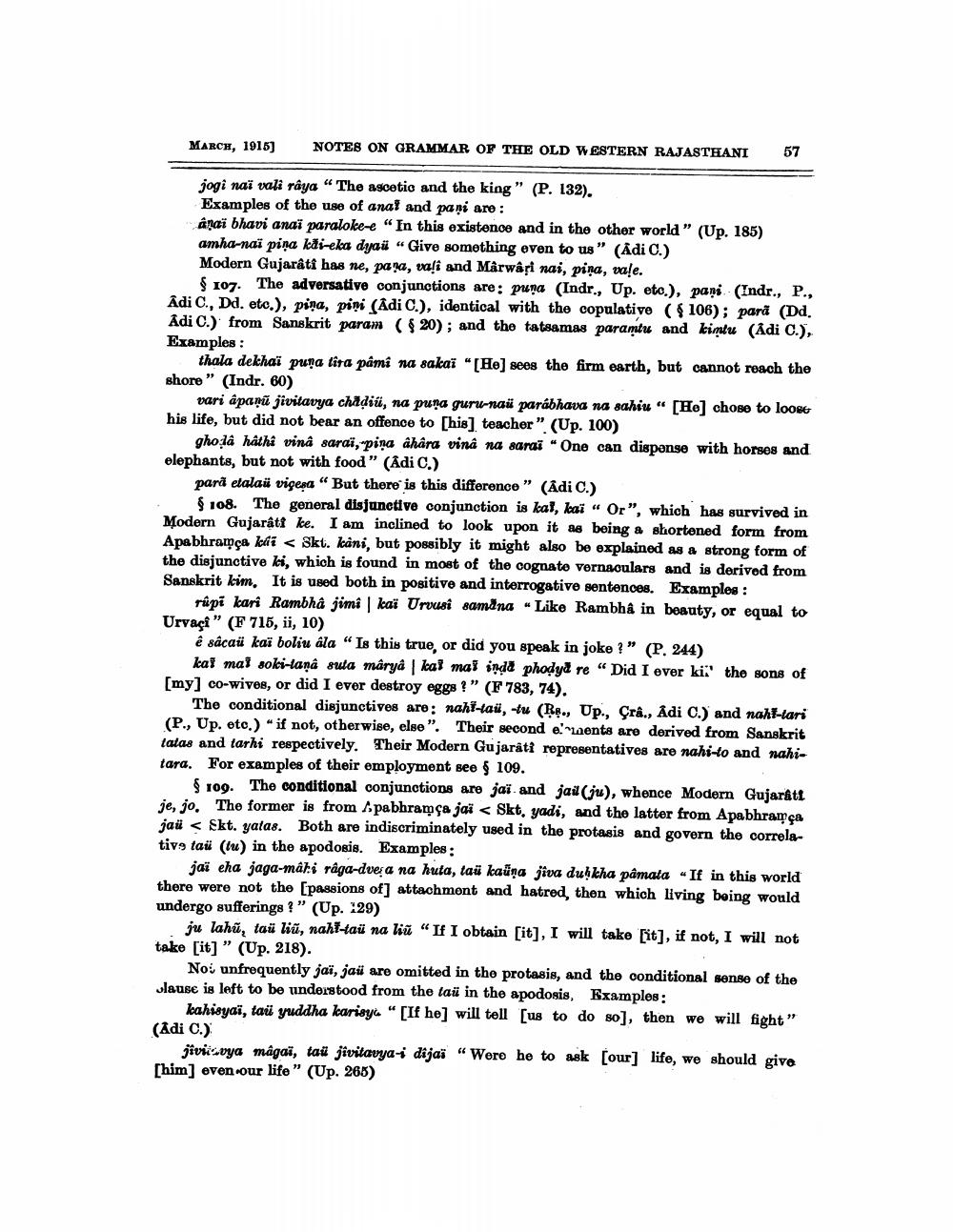________________
MARCH, 1916)
NOTES ON GRAMMAR OF THE OLD WESTERN RAJASTHANI
57
jogi naï vali raya " The ascetic and the king" (P. 132). Examples of the use of anal and pani are: Anaï bhavi anai paraloke-e "In this existence and in the other world" (Up. 185) amha-nai piņa kai-eka dyaü "Give something oven to us" (Ådi C.) Modern Gujarati has ne, para, vali and Marwari nai, pina, vale.
$ 107. The adversative conjunctions are: puna (Indr., Up. eto.), paņi (Indr., P., Adi C., Dd. etc.), ping, pini (Adi C.), identical with the copulative (106); pară (Dd. Adi C.) from Sanskrit paran (920); and the tatsamas paramtu and kimtu (Adi C.), Examples:
thala dekhaï puna tira pami na sakai "[He] sees the firm earth, but cannot reach the shore" (Indr. 60)
vari aparū jivitavya chidiü, na puna guru-naü parábhava na sahiu " [Ho] chose to loose his life, but did not bear an offence to [his] teacher”. (Up. 100)
gho là hátha vina sarai,-piņa âhâra vina na sarai "One can dispense with horses and elephants, but not with food" (Adi C.)
para elalaü vigena" But there is this difference” (Adi C.)
108. The general disjunctive conjunction is kal, kai “ Or", which has survived in Modern Gujarati ke. I am inclined to look upon it as being & shortened form from Apabhramca kii < Skt. kani, but possibly it might also be explained as a strong form of the disjunctive li, which is found in most of the cognate vernaculars and is derived from Sanskrit kim. It is used both in positive and interrogative sentences. Examples:
rûpi kari Rambha jimi kaï Urvusi samana · Like Rambhê in beauty, or equal to Urvaci" (F 715, ii, 10)
sacaü kaï boliu ala "Is this true, or did you speak in joke?” (P. 244)
kai mal soki-lama sula mâryâ kai mai inda phodyd re “Did I ever kick the sons of [my] co-wives, or did I ever destroy eggs?" (F 783, 74).
The conditional disjunctives are: nahi-tau, tu (RR., Up., Sra., Adi C.) and nahl-lari (P., Up. eto.)" if not, otherwise, else". Their second e' inents are derived from Sanskrit tatas and tarhi respectively. Their Modern Gujarati representatives are nahi-lo and nahitara. For examples of their employment see $ 109.
100. The conditional conjunctions are jaï and jail (ju), whence Modern Gujarati je jo. The former is from Apabhram ça jai < Skt, yadi, and the latter from Apabhramça jaü < Ekt. yatas. Both are indiscriminately used in the protasis and govern the correlative taü (tu) in the apodosis. Examples:
jaï eha jaga-mahi raga-dvera na huta, taä kaüņa jiva dulcha pamata "If in this world there were not the passions of] attachment and hatred, then which living being would undergo sufferings?" (Up. 129)
ju lahū, taü liū, nahl-taü na liű "If I obtain [it], I will take [it], if not, I will not take [it] " (Up. 218).
Noi unfrequently jai, jaü are omitted in the protasis, and the conditional sense of the lause is left to be understood from the tail in the apodosis, Examples:
kahisyai, taü yuddha karisya. "[If he] will tell [us to do so], then we will fight " (Adi C.)
jivi vya magai, tai jivitavya-i dijai "Were he to ask [our] life, we should give [him] even our life" (Up. 265)




